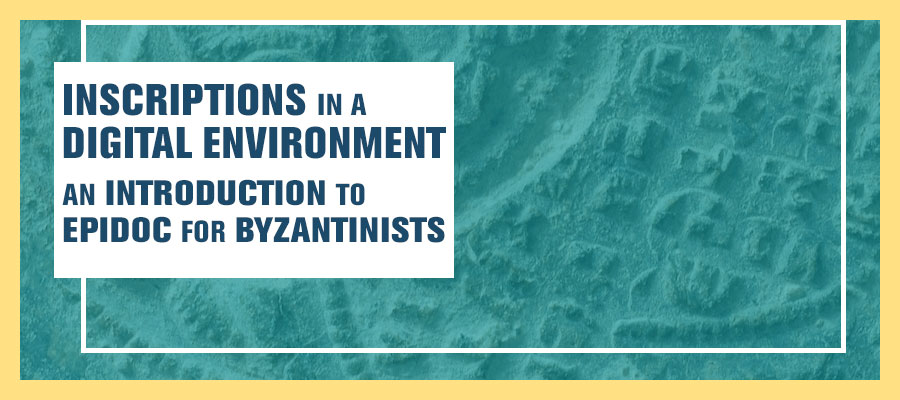Inscriptions in a Digital Environment: An Introduction to EpiDoc for Byzantinists
In this online workshop, participants will explore the use of EpiDoc, the established standard for digitally encoding ancient inscriptions, papyri, and other primary and documentary texts in TEI XML for online publication and interchange. The workshop will also introduce the participants to the EFES (EpiDoc Front-End Services) platform for viewing and publishing EpiDoc editions. The workshop will include asynchronous tutorials, real-time sessions, and guided hands-on exercises. Participants will have the opportunity to work with their own epigraphic material, broadly understood.
Course Outline
- Friday, April 5, 2024, 11:00 am–3:00 pm EDT (break: 12:30–1:00 pm): Basic rules of XML. Introduction to EpiDoc and EFES. Installing and prepping your EFES. Structure of the EpiDoc XML document. Encoding of metadata.
- Friday, April 12, 2024, 11:00 am–3:00 pm EDT (break: 12:30–1:00 pm): Εncoding of epigraphic text.
- Friday, April 26, 2024, 11:00 am–3:00 pm EDT (break: 12:30–1:00 pm): Indexing and querying in EFES.
Prerequisites & Time Commitment
- Participants should to be familiar with the transcription conventions for inscriptions ("Leiden").
- Participants should have proficiency in either Greek, Latin, or other ancient languages pertinent to their epigraphic tradition.
- The time commitment for this workshop is 12 hours of instruction and an additional 5 hours for review of asynchronous materials and approximately 3 hours between each session for practice exercises and preparation for the following session. Participants are expected to attend all sessions.
Workshop Checklist
- Computer with Java 8 (at least) installed. HERE is how you can check what the current version on your computer is, and HERE is a link for download if you do not have Java installed.
- Oxygen XML Editor pre-installed. If you do not have Oxygen XML Editor, check with your university’s IT department. Many universities have Oxygen license keys for students and faculty. If Oxygen XML Editor is not available through your university, you request a free 30-day demo license HERE.
- EFES (EpiDoc Front-End Services) pre-installed. You can download it HERE (https://github.com/EpiDoc/EFES) (green button > download ZIP) or clone it if you are already acquainted with Git.
- Stable internet connection.
- Laptop users will find a mouse useful.
- A second screen if possible. A second screen will allow you to follow the discussion and the training on one screen while you work on the other.
- Data! This is a hands-on workshop. Please bring an inscription(s) that you are working with or that you plan to work with in the future.
The workshop is limited to 15 participants. Registration is first come, first served. REGISTRATION IS CLOSED.
Who is eligible?
- Graduate students and early career researchers (PhD received after April 2016) in the field of Byzantine studies. Students enrolled in graduate programs in North America and early career researchers working in North America will be given priority. Graduate students and early career researchers outside of North America will be placed on a waiting list and contacted if space is available.
- All participants must be BSANA members. BSANA membership is free for graduate students and early-career contingent scholars who have earned their PhD within the last eight years and who do not hold a permanent or tenure-track appointment. If you are not already a BSANA member, please complete the BSANA Membership Form before registering for the workshop. Your membership status will be confirmed before your space in the workshop is confirmed.
This workshop is part of the partnership between the Mary Jaharis Center for Byzantine Art and Culture and the Byzantine Studies Association of North America to provide digital humanities training opportunities to graduate students and early career researchers.
